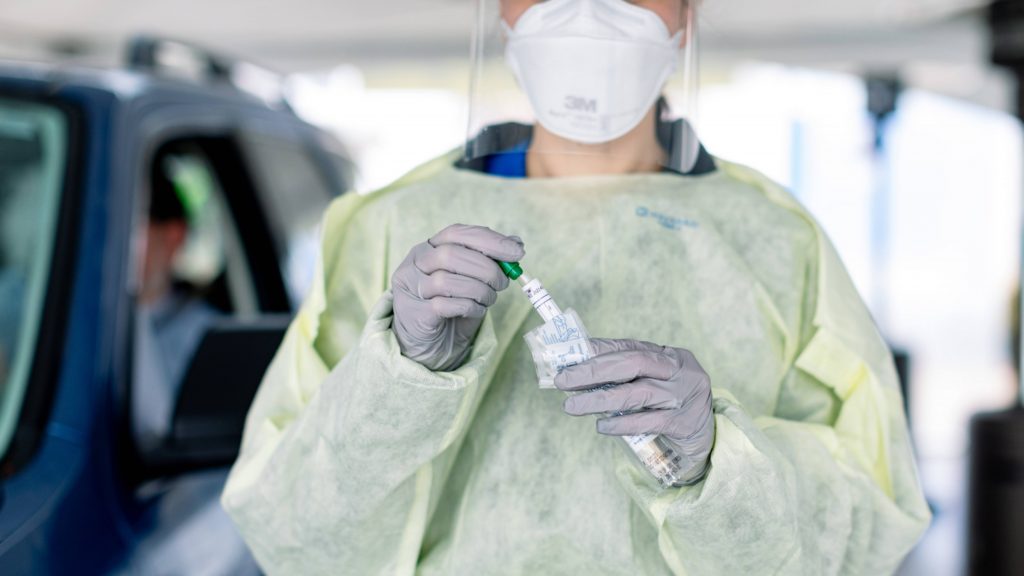-
Individualized Medicine
Who should get COVID-19 testing?

Dr. Bobbi Pritt, a clinical microbiologist at Mayo Clinic, acknowledges that there seems to be a lot of confusion with the general public when it comes to COVID-19 testing. Terms like viral, molecular, serology and antibodies, and convalescent plasma have sprung up in everyday language when talking about COVID-19 — but do you really need to know all of these terms or is it just causing more confusion? Let’s break it down to what you need to know and why it’s important for you.
Two COVID-19 tests
Swab test (diagnostic test) — Do you have it?
If you’re experiencing signs and symptoms of COVID-19, like fevers, chills, body aches, trouble breathing, and so on, this test may be recommended to you by your health care provider. It detects the virus responsible for COVID-19. If you test positive for COVID-19 from the swab test, you will be asked to self-isolate to stop the spread of infection. Health officials may also conduct contact tracing to determine whether you may have exposed others to the virus. If so, those who came into contact with you may need to self-isolate. Most people will recover from home safely and will not require hospitalization. However, if you are experiencing troublesome symptoms such as difficulty breathing, call your health care provider.
For those who have tested positive and recovered from COVID-19 a blood test for antibodies is not recommended for everyone at this time.
Blood test (antibodies test or serology test) — Did you have it?
The blood test for antibodies is used to determine how many people in a population have been infected with COVID-19. This test identifies whether you had COVID-19 and have developed some degree of immunity against the virus that could prevent re-infection.
Another important reason for this test is to identify people who have recovered from COVID-19 and may want to donate plasma to be used to treat other patients with severe COVID-19.
According to Dr. Pritt whether you have COVID-19 or had it, there is no magic test or easy answer when it comes to testing.
"We don’t know how protective these antibodies are at this time, and how long they last," says Dr. Pritt. "Therefore, a positive test doesn’t guarantee protection against re-infection with the COVID-19 virus."
With the stay-at-home order in many communities across the U.S. being lifted, understanding testing and taking preventive measures are more important than ever for you and your community.
What preventive measures should you take to protect yourself and others from COVID-19?
- Wash your hands often
- Get tested when you’re sick
- Maintain social distance
- Wear a mask
- Stay home when able
- Follow state, local, and employer guidelines
Dr. Pritt also emphasizes the importance of following up on your results if you were tested.
"If you were tested and have not received your results, please reach out to your health care provider by phone or email," says Dr. Pritt. "Whether your results are positive or negative, it's important that you know so you can take the right steps in stopping the spread of the virus."
This infographic shows when it is necessary to get COVID-19 testing:

Recovered from COVID-19? Please consider donating your blood. The national resource sharing network will help you find a blood donation location near you. Mayo Clinic, the American Red Cross and the larger blood-banking community are working with physicians to collect and distribute donor plasma to hospitalized patients with severe or life-threatening COVID-19.
Information in this post was accurate at the time of its posting. Due to the fluid nature of the COVID-19 pandemic, scientific understanding along with guidelines and recommendations may have changed since the original publication date.
Check the Centers for Disease Control and Prevention website for additional updates on COVID-19. For more information and all your COVID-19 coverage, go to the Mayo Clinic News Network and mayoclinic.org.
Related Articles







